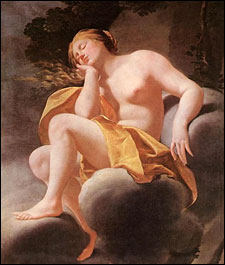|
|
|
|

Simon Vouet. Sleeping Venus, 1630-40.
On Desire. A Pindaric.
by Aphra Behn
What art thou, O thou new-found pain?
From what infection dost thou spring?
Tell me — oh! Tell me thou enchanting thing,
Thy nature, and thy name;
Inform me by what subtle art,
What powerful influence,
You got such vast dominion in a part
Of my unheeded, and unguarded, heart,
That fame and honour cannot drive ye thence.
Oh! Mischievous usurper of my peace;
Oh! Soft intruder on my solitude,
Charming disturber of my ease,
That hast my nobler fate pursued,
And all the glories of my life subdued.
Thou haunt'st my inconvenient hours;
The business of the day, nor silence of the night,
That should to cares and sleep invite,
Can bid defiance to thy conquering powers.
Where hast thou been this live-long age
That from my birth till now,
Thou never couldst one thought engage,
Or charm my soul with the uneasy rage
That made it all its humble feebles know?
Where wert thou, Oh malicious sprite,
When shining honour did invite?
When interest called, then thou wert shy,
Nor to my aid one kind propension brought,
Nor wouldst inspire one tender thought,
When princes at my feet did lie.
When thou couldst mix ambition with my joy,
Then peevish phantom thou wert nice and coy,
Not beauty could invite thee then
Nor all the arts of lavish men!
Not all the powerful rhetoric of the tongue
Not sacred wit could charm thee on;
Not the soft play that lovers make,
Nor sigh could fan thee to a fire,
Not pleading tears, nor vows could thee awake,
Or warm the unformed something — to desire.
Oft I've conjured thee to appear
By youth, by love, by all the powers,
Have searched and sought thee everywhere,
In silent groves, in lonely bowers:
On flowery beds where lovers wishing lie,
In sheltering woods where sighing maids
To their assigning shepherds hie,
And hide their blushes in the gloom of shades:
Yet there, even there, though youth assailed,
Where beauty prostrate lay and fortune wooed,
My heart insensible to neither bowed
Thy lucky aid was wanting to prevail.
In courts I sought thee then, thy proper sphere
But thou in crowds wert stifled there,
Int'rest did all the loving business do,
Invites the youths and wins the virgins too.
Or if by chance some heart thy empire own
(Ah power ingrate!) the slave must be undone.
Tell me, thou nimble fire that dost dilate
Thy mighty force through every part,
What God, or human power did thee create
In me, till now, unfacile heart?
Art thou some welcome plague sent from above
In this dear form, this kind disguise?
Or the false offspring of mistaken love,
Begot by some soft thought that faintly strove,
With the bright piercing beauties of Lysander's eyes?
Yes, yes, tormentor, I have found thee now;
And found to whom thou dost thy being owe:
'Tis thou the blushes dost impart,
For thee this languishment I wear,
'Tis thou that tremblest in my heart
When the dear shepherd does appear,
I faint, I die with pleasing pain,
My words intruding sighing break
When e'er I touch the charming swain
When e'er I gaze, when e'er I speak.
Thy conscious fire is mingled with my love,
As in the sanctified abodes
Misguided worshippers approve
The mixing idol with their gods.
In vain, alas, in vain I strive
With errors, which my soul do please and vex,
For superstition will survive,
Purer religion to perplex.
Oh! Tell me you, philosophers, in love,
That can its burning feverish fits control,
By what strange arts you cure the soul,
And the fierce calenture remove?
Tell me, ye fair ones, that exchange desire,
How 'tis you hid the kindling fire.
Oh! Would you but confess the truth,
It is not real virtue makes you nice:
But when you do resist the pressing youth,
'Tis want of dear desire, to thaw the virgin ice.
And while your young adorers lie
All languishing and hopeless at your feet,
Raising new trophies to your chastity,
Oh tell me, how you do remain discreet?
How you suppress the rising sighs,
And the soft yielding soul that wishes in your eyes?
While to th'admiring crowd you nice are found;
Some dear, some secret youth that gives the wound
Informs you, all your virtue's but a cheat
And honour but a false disguise,
Your modesty a necessary bait
To gain the dull repute of being wise.
Deceive the foolish world — deceive it on,
And veil your passions in your pride;
But now I've found your feebles by my own,
For me the needful fraud you cannot hide.
Though 'tis a mighty power must move
The soul to this degree of love
And though with virtue I the world perplex,
Lysander finds the weakness of my sex,
So Helen while from Theseus' arms she fled,
To charming Paris yields her heart and bed.
|
Source:
Early Modern Women's Writing. Paul Salzman, ed.
Oxford: Oxford University Press, 2000. 382-385.
 | to Works of Aphra Behn |
Site copyright ©1996-2011 Anniina Jokinen. All Rights Reserved.
Page created by Anniina Jokinen on June 23, 2006. Last updated on March 3, 2011.
|
|
|